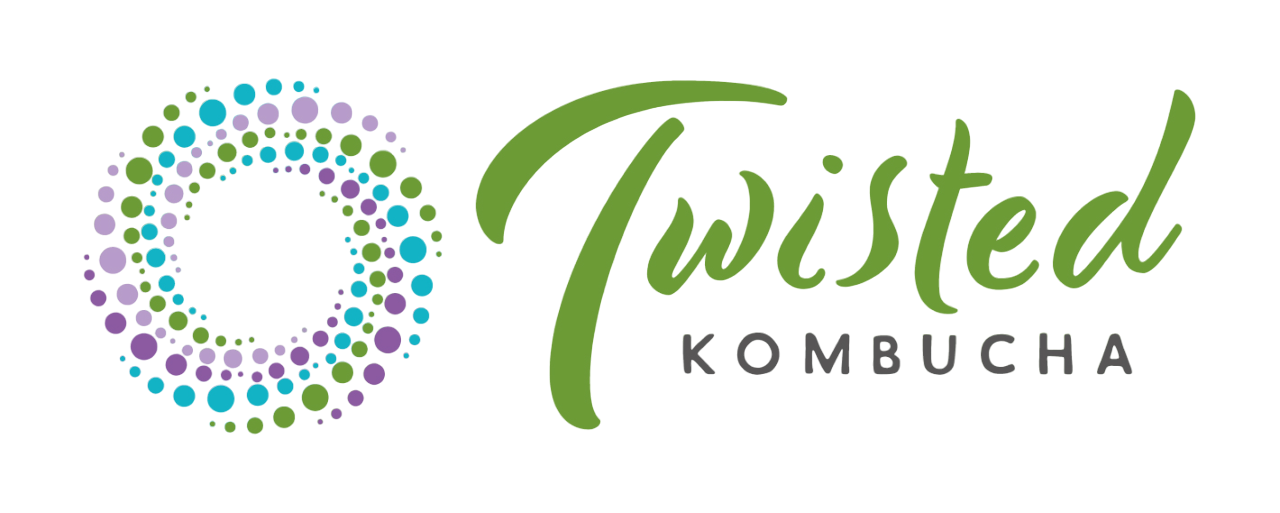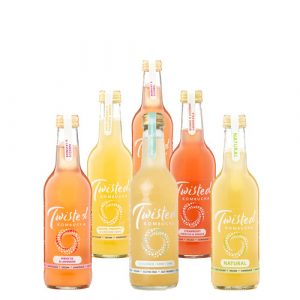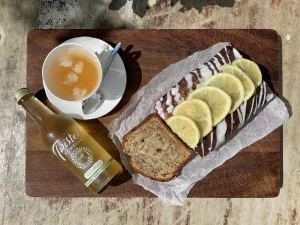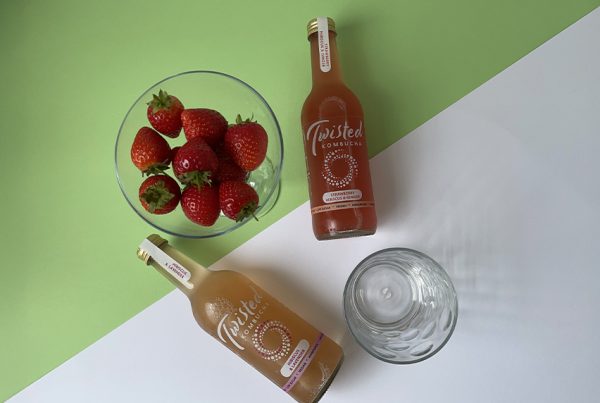
Hey, Twisted Tribe! It’s Lou again, and today we’re going to delve into the mystifying world of fermentation.
In this blog, I’ll explain the kombucha fermentation process and what it spells for your overall health. We’ll take a deep dive into what ferments kombucha and why freshly fermented kombucha is the elixir your body needs.
Let’s get into it!
What Is Kombucha, The Fermented Beverage?
If you’re new to the amazing world of kombucha, don’t worry. Before I explain how it’s made, I’ll give you a quick run-down of what fermented kombucha is.
Kombucha isn’t just a drink; it’s a nutritional powerhouse created through fermentation. This ancient elixir starts as sweetened tea and, through the magic of microbial action, transforms into a fizzy, tangy delight loaded with health benefits.
How Is Kombucha Fermented?
So, how is kombucha fermented? Let’s demystify the process.
Firstly, kombucha wouldn’t exist if not for a Symbiotic Culture Of Bacteria and Yeast, AKA SCOBY. It works synergistically, breaking down sugars in the tea into organic acids, B vitamins, enzymes, and probiotics. It’s like a mini biochemical factory in a jar! Here’s how it’s done:
- Starting Point: The process kicks off with a sweetened tea, usually black or green tea infused with sugar. This concoction serves as the nutrient-rich canvas for microbial artistry.
- The SCOBY Marvel: The SCOBY, resembling a rubbery pancake, takes centre stage. Comprising various strains of bacteria and yeast, this living culture acts as a catalyst for change.
- Fermentation Commences: As the SCOBY is introduced to the sweetened tea, the magic unfolds. Yeast components of the SCOBY convert sugars into alcohol in the initial fermentation phase.
- Acrobatics of Bacteria: Bacterial components of the SCOBY step in during the second phase, converting alcohol into organic acids such as acetic acid. This imparts the tangy flavour synonymous with kombucha.
- Nutrient Infusion: Alongside the flavour transformation, essential nutrients like B vitamins, enzymes, and probiotics emerge, making kombucha more than just a tasty beverage.
- Bottling and Carbonation: The first fermentation concludes, but the journey doesn’t end. Additional flavours can be infused, and secondary fermentation can heighten carbonation. This is where the fizzy charm takes centre stage.
- The Result? A Living Elixir: What emerges from this intricate dance is a living elixir, teeming with beneficial microorganisms, ready to impart its unique flavour and potential health benefits.
As a result of this alchemical process, kombucha transcends the realms of a mere beverage, demonstrating how nature’s biochemical wonders work in harmony.
What Ferments Kombucha?
At the heart of every batch of kombucha lies the enigmatic SCOBY, a living tapestry that orchestrates the fermentation symphony. The SCOBY is responsible for conducting the biochemical orchestra in kombucha’s fermentation process.
Main Components of SCOBY
- Acetobacter (Bacteria): This bacterial virtuoso takes center stage in the fermentation process, converting ethanol into acetic acid. It’s responsible for the tangy kick that defines kombucha.
- Saccharomyces (Yeast): A pivotal yeast member of the SCOBY, Saccharomyces, ushers in the initial fermentation. It transforms sugars into alcohol, laying the foundation for the subsequent bacterial transformations.
- Lactobacillus (Bacteria): Adding its notes to the harmony, Lactobacillus plays a crucial role in producing lactic acid. This not only contributes to the beverage’s flavour but also enhances its probiotic profile.
- Various Yeast Strains: Beyond Saccharomyces, multiple yeast strains contribute their unique flavours and metabolic activities, adding layers of complexity to the kombucha brew.
What Does The SCOBY Do?
- Sugar Conversion: The SCOBY’s yeast elements kick off the process by converting sugars in the sweetened tea into alcohol, setting the stage for subsequent transformations.
- Alcohol to Acids: As the fermentation progresses, the bacterial components of the SCOBY, notably Acetobacter, convert alcohol into organic acids like acetic and lactic acid. This not only imparts flavour but also preserves the beverage.
- Probiotic Symphony: The collective action of the SCOBY components results in the infusion of probiotics, live microorganisms known for their potential health benefits. These probiotics contribute to the gut-friendly nature of kombucha.
First Fermentation vs Second Fermentation
Now that you know the brewing process, we can get into the details of the two main fermentation processes!
- First Fermentation: In the primary fermentation, the SCOBY initiates the conversion of sugars into alcohol, catalyzed by yeast. This step establishes the core composition of kombucha. The yeast and bacteria in the SCOBY then collaborate to metabolize the alcohol into organic acids, contributing to the tangy taste and preservation of probiotics, laying the groundwork for kombucha’s nutritional profile.
- Second Fermentation: Following the foundational phase, the second fermentation introduces additional ingredients, intensifying flavours. The sealed environment facilitates heightened carbonation, leading to a fizzy texture. This phase not only refines taste but also allows the kombucha to mature, attaining an optimal flavour equilibrium. The combined effect of these fermentation stages results in a diverse and gut-friendly beverage.
How Do You Know When Kombucha First Fermentation Is Done?
Achieving kombucha perfection requires patience. Knowing when the first fermentation is done involves observing specific visual and sensory cues.
As the fermentation progresses, the liquid transforms from a sweet tea flavour to a tangier profile. The SCOBY, initially placed at the surface, tends to move and might even form a new layer.
A crucial indicator is the absence of sweetness, signifying the consumption of sugars by the microorganisms. Additionally, a taste test can be informative – when the kombucha achieves the desired balance between sweetness and tartness, the first fermentation is likely concluded.
Regular monitoring and sampling during the process help in gauging the optimal stage for transitioning to the second fermentation or bottling.
Why Is Fermented Kombucha Good For Health?
Alright, now you know how kombucha is made. What about its benefits? Why is fermented kombucha so good for health? Let’s find out:
- Gut Guardian: Kombucha is a probiotic powerhouse, fostering a flourishing gut microbiome. A healthy gut translates to enhanced digestion, improved nutrient absorption, and a robust immune system.
- Detox Dynamo: The organic acids produced during fermentation support your liver’s natural detoxification process, helping your body eliminate unwanted substances.
- Heart Harmony: Regular consumption of kombucha may contribute to heart health by reducing bad cholesterol levels and promoting overall cardiovascular well-being.
- Joint Juggernaut: Glucosamines present in kombucha support joint health, keeping you agile and active, especially as the years roll by.
- Metabolism Maestro: Kombucha’s potential to boost metabolic rates could be a game-changer for those on a weight management journey.
- Stress Soother: The B vitamins in kombucha play a role in stress management, contributing to a calmer, balanced mind.
Conclusion
And there you have it! I hope this blog answered any questions you may have had about the kombucha brewing process and the health benefits of kombucha as a fermented beverage.
If you’re looking to dive into the world of kombucha, please keep in mind that not all kombuchas are created equally. Many large-scale manufacturers use unnecessary sweeteners and unnatural preservatives that can have an adverse effect on your health.
Don’t settle for less when you can have the best with small-scale batches packed with love! At Twisted Kombucha, we’re dedicated to maintaining the ancient standard of all-natural, raw kombucha. Each bottle of Twisted Kombucha is made with the utmost care and packed with all the beneficial nutrients your body needs. Sustainable, eco-friendly, and ethically sourced, our brews are ideal for vegan diets too!
Try it out today and get 15% off on your very first order. Cheers to a healthier, happier you!
FAQs
Is Kombucha a vegan-friendly drink?
Yes, Twisted Kombucha is entirely vegan, aligning with ethical and sustainable choices.
Does Kombucha contain artificial sweeteners or preservatives?
No, Twisted Kombucha is crafted with only the best all-natural ingredients, without any added preservatives or artificial sweeteners.
How often should I drink Kombucha for health benefits?
Incorporating Kombucha into your routine a few times a week can contribute to overall well-being. However, individual preferences may vary.
Is Kombucha safe for those with heart issues?
Regular consumption may contribute to heart health by reducing bad cholesterol levels and promoting overall cardiovascular well-being.
What makes Twisted Kombucha sustainable?
Twisted Kombucha is committed to sustainability, sourcing ingredients ethically and utilizing environmentally friendly practices in its production processes.













